
Click to Skip Ahead
Comparing ferrets and cats is a worthwhile endeavor because of the similarities between the two species. Both are clean animals, with litter box training as an option. You can also train them to use a leash. They are intelligent and can form bonds with humans. However, any pet requires a time and financial investment. That’s where many of the differences exist between ferrets and cats.
Still, there are other things to consider. These factors involve care, cost, and practicality. For example, the chances are you won’t need a permit to get a cat. That’s not the case in several states when it comes to ferrets, including New Jersey and Rhode Island. Some places forbid ferrets, such as Hawaii and California. So, what other differences do you need to know about?
Visual Differences
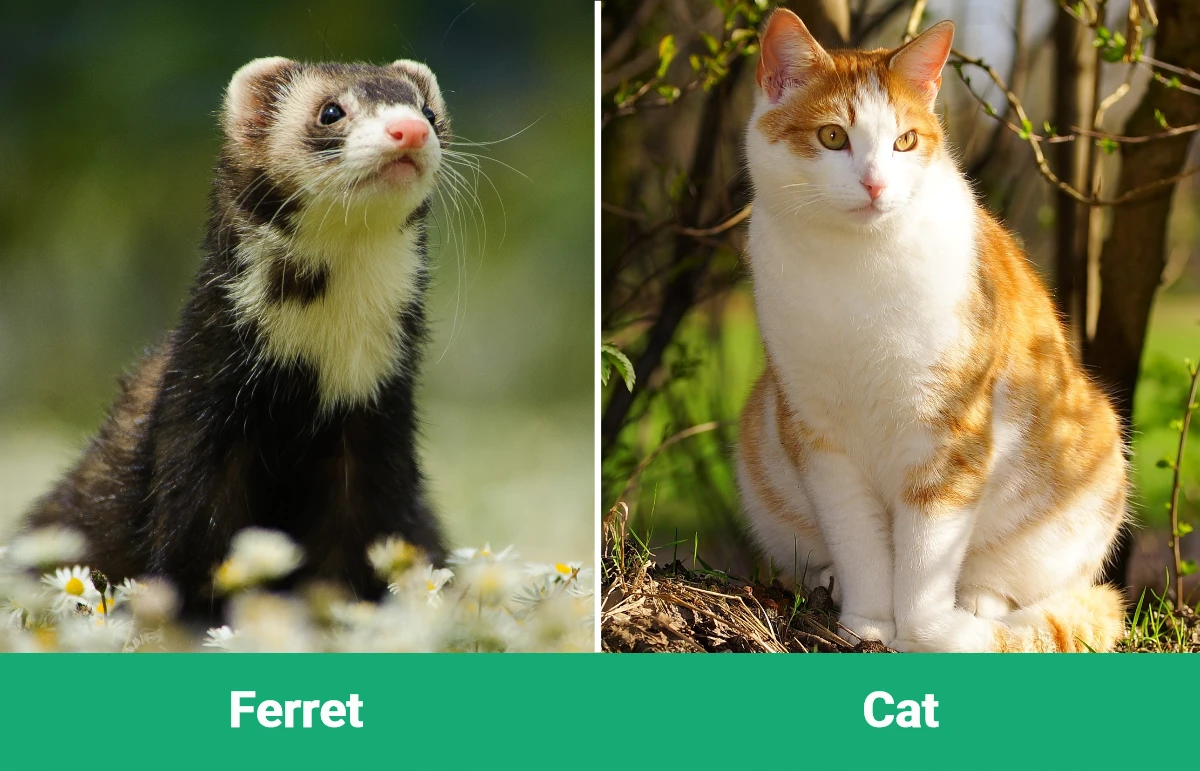
At a Glance
Ferret Overview
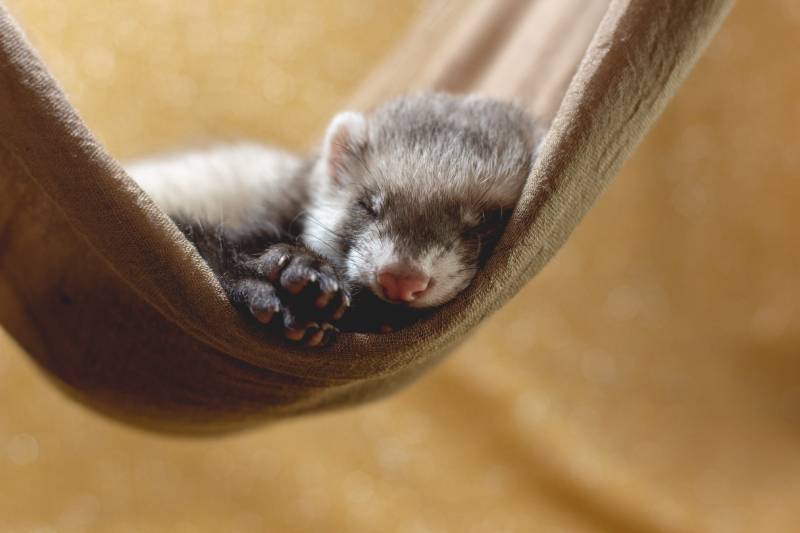
We know from early accounts that humans had a relationship with ferrets going back over 2,500 years. Cats have been a part of our world at least 12,000 years ago, coinciding with the dawn of agriculture. Interestingly, ferrets and cats served similar roles as hunters of pests. Therein lies the basis of a comparison between the two species.
Personality / Character
Ferrets are friendly animals that are highly curious with the body shape and size to accommodate these traits. They have responded well to domestication and are quite manageable, even if they bite occasionally. They are sociable creatures that fare best if housed with another mustelid friend. They are curious and might be even more social than cats.
Care instructions often include monitoring your pet outside of their cage because they can get into anything. They’ll follow their curiosity wherever it takes them, no matter if it’s safe or not. Like cats, ferrets sleep a lot, making them an excellent choice for quiet households.
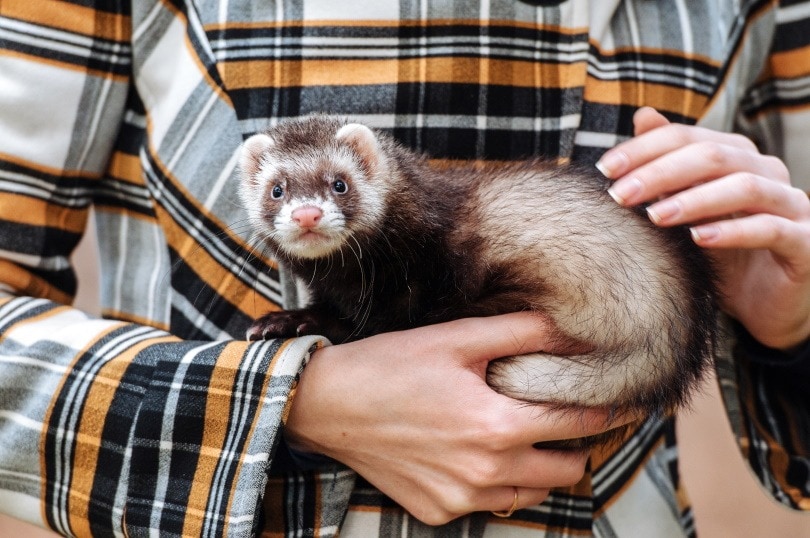
Health & Care
We referred to ferrets as mustelids. The term refers to carnivorous animals with musky scent glands at their hind end. Most sellers offer de-scented ferrets. However, that’s not a guarantee of an odor-free pet. You shouldn’t bathe your ferret to fend off the smell since it can dry out their skin. You can brush them and use grooming products to control the odor.
Most likely, you’ll get a pet already de-scented and neutered. We suggest discussing vaccinations and routine care with your veterinarian. Your ferret should get an annual exam at the minimum. You should ask about getting your pet a rabies vaccination approved for use in these animals. Unlike cats, your ferret will probably be a strictly indoor pet with possible harnessed walks outside.
Suitable For:
Ferrets are suitable for individuals who understand the unique needs of these animals. Their intelligence makes mental stimulation imperative for their mental and physical well-being. They require daily handling to keep them tame. We recommend getting more than one animal to satisfy their social needs. A ferret isn’t as expensive as owning a cat, but the time investment might outweigh a feline.
Cat Overview
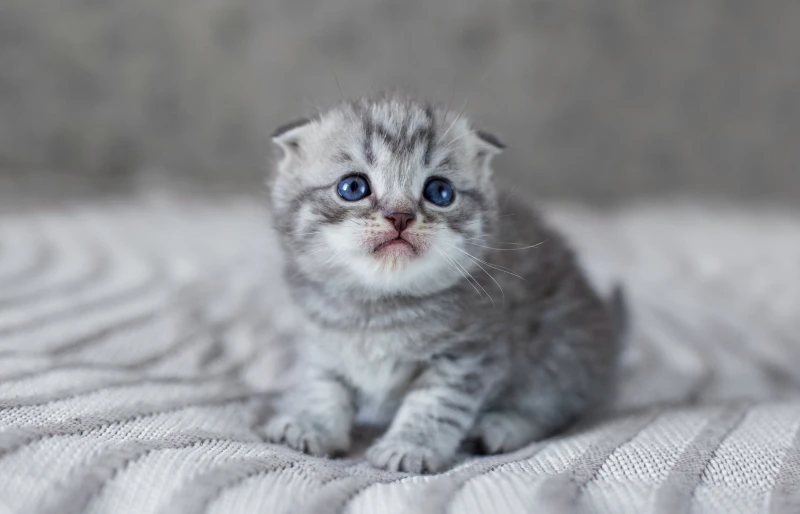
While we don’t know a lot about the domestication of ferrets, the occurrence with cats seems like one of convenience. Felines met their needs for reliable prey by hanging around places where people congregated, and humans benefited from effective pest control. They did this one job and succeeded at it.
Personality / Character
Selective breeding has encouraged many traits in cats that you won’t see as well-defined in ferrets. Therefore, you have more latitude in choosing a kitty to fit your lifestyle and personality. You can pick a cat that is more predisposed to being affectionate or getting along with other animals. However, remember that environmental factors are also a profound influence.
Many people consider cats aloof and standoffish. That’s not always the case. Felines bond with their human companions more than you may think. They learn their names and fine-tune vocalizations to communicate with their owners. They are closer to their wild side because of the circumstances of their relationships with people. Pet owners also reinforce the stereotypical behaviors.
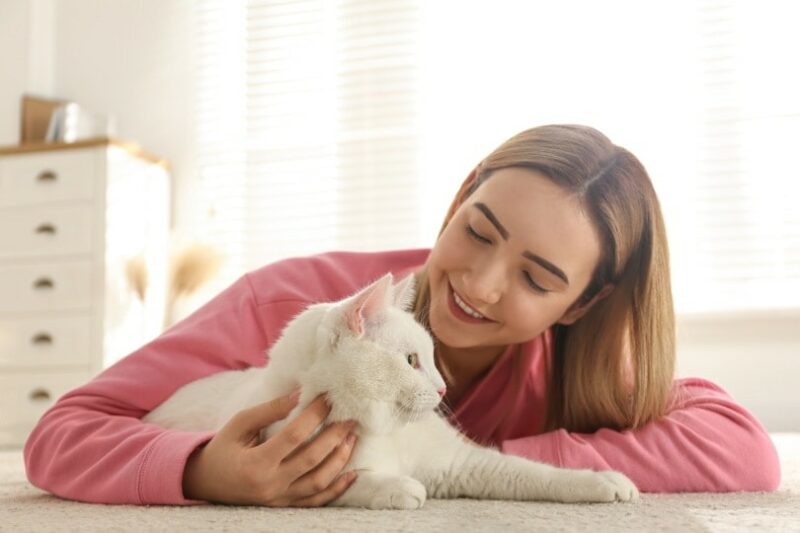
Health & Care
One reason many people choose cats over dogs is their independence. They self-groom, and they do an excellent job of taking care of themselves. This is a selling point when comparing felines and ferrets. Daily care is necessary for both if just to scoop the litter box, but you must also clean your ferret’s cage. You don’t have that issue with a home-dwelling cat.
Cats should also get annual exams. Vaccinations are also required, even for strictly indoor animals. Felines often hide illnesses until it becomes necessary for you to intervene. Self-care can work in some cases. However, it also means sometimes prolonged or expensive care when your pet can’t mask their signs any longer. Also, cats are relatively long-lived compared to ferrets.
Suitable For:
Cats are an excellent choice for individuals and families who are away from home a lot. They sleep up to 18 hours daily. They will also learn your schedule and adjust theirs accordingly. You don’t have to walk them daily. They live up to their reputation as independent animals, which can suit many people’s lifestyles while allowing them to enjoy the benefits of owning a pet.
Which Animal Is Right for You?
Part of the answer lies in how interactive you want to be with your pet. Both require some daily care. Regular interaction is essential for the physical and mental well-being of both animals. Cats can give you more leeway if you have a fluctuating schedule. They can find well for themselves as long as you provide fresh food and water daily. On the other hand, ferrets need a companion if you can’t always be there for them, and they require a bit more work and attention.
Featured Image Credit: Top – ambquinn, Pixabay | Bottom – JACLOU-DL, Pixabay







